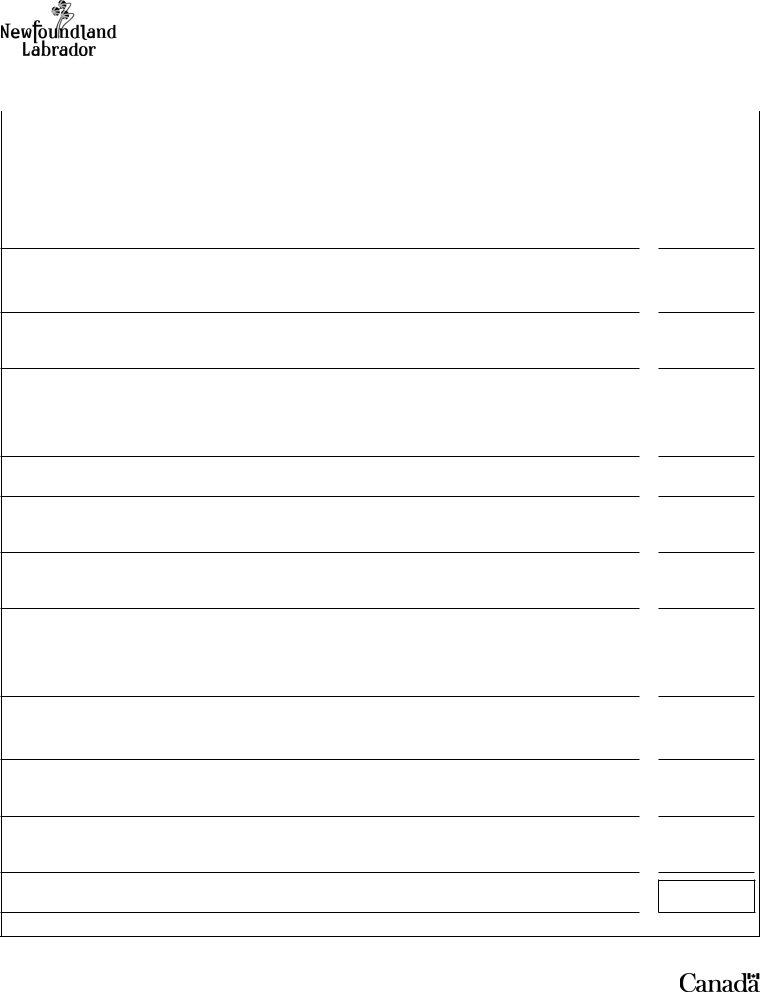The Canada TD1NL form, officially known as the 2013 Newfoundland and Labrador TD1NL Personal Tax Credits Return, is a crucial document for both employees and pensioners residing in Newfoundland and Labrador. This form plays a fundamental role in determining the amount of provincial tax deductions by employers or payers. Before completing this form, individuals are advised to thoroughly read the instructions provided to ensure an accurate estimation of their circumstances. The form encompasses a variety of sections including the basic personal amount, age amount, pension income amount, tuition and education amounts, as well as credits for disabilities, spouses or common-law partners, eligible dependants, caregivers, and infirm dependants age 18 or older. Additionally, it covers amounts that can be transferred from a spouse or common-law partner and from dependants. The total claim amount calculated at the end informs the employer or payer of the tax deductions to be made. Navigating through the TD1NL form requires careful consideration of one’s personal and financial situation, as it directly impacts the net income. For non-residents, social insurance number and country of permanent residence details are mandatory, further highlighting the form's comprehensive nature. Its completion and submission are not just formalities but are essential steps in managing one’s tax obligations effectively in Newfoundland and Labrador.
| Question | Answer |
|---|---|
| Form Name | Canada Form Td1Nl |
| Form Length | 2 pages |
| Fillable? | No |
| Fillable fields | 0 |
| Avg. time to fill out | 30 sec |
| Other names | what is a td1 form, 2020 newfoundland and labrador personal tax credits return, td1 form nl, RRSP |

2013 Newfoundland and Labrador |
TD1NL |
Personal Tax Credits Return |
|
Your employer or payer will use this form to determine the amount of your provincial tax deductions.
Read the back before completing this form. Complete this form based on the best estimate of your circumstances.
Last name |
First name and initial(s) |
Date of birth (YYYY/MM/DD) |
Employee number |
||||||||
|
|
|
|
|
|
|
|
|
|
|
|
Address including postal code |
|
For |
Social insurance number |
||||||||
|
|
Country of permanent residence |
|
|
|
|
|
|
|
|
|
|
|
|
|
|
|
|
|
|
|
|
|
|
|
|
|
|
|
|
|
|
|
|
|
|
|
|
|
|
|
|
|
|
|
|
|
1.Basic personal amount – Every person employed in Newfoundland and Labrador and every pensioner residing in Newfoundland and Labrador can claim this amount. If you will have more than one employer or payer at the same time in 2013, see "Will you have
more than one employer or payer at the same time?" on the next page. |
8,451 |
|
2.Age amount – If you will be 65 or older on December 31, 2013, and your net income from all sources will be $29,563 or less, enter $5,395. If your net income for the year will be between $29,563 and $65,530 and you want to calculate a partial claim, get the
3.Pension income amount – If you will receive regular pension payments from a pension plan or fund (excluding Canada Pension Plan, Quebec Pension Plan, Old Age Security, or Guaranteed Income Supplement payments), enter $1,000, or your estimated annual pension income, whichever is less.
4.Tuition and education amounts (full time and part time) – If you are a student enrolled at a university, college, or educational institution certified by Human Resources and Skills Development Canada, and you will pay more than $100 per institution in tuition fees, complete this section. If you are enrolled full time, or if you have a mental or physical disability and are enrolled part time, enter the total of the tuition fees you will pay, plus $200 for each month that you will be enrolled. If you are enrolled part time and do not have a mental or physical disability, enter the total of the tuition fees you will pay, plus $60 for each month that you will be enrolled part time.
5.Disability amount – If you will claim the disability amount on your income tax return by using Form T2201, Disability Tax
Credit Certificate, enter $5,703.
6.Spouse or
7.Amount for an eligible dependant – If you do not have a spouse or
8.Caregiver amount – If you are taking care of a dependant who lives with you, whose net income for the year will be $13,116
or less, and who is either your or your spouse's or
relative (aged 18 or older) who is dependent on you because of an infirmity, enter $2,684.
If the dependant's net income for the year will be between $13,116 and $15,800 and you want to calculate a partial claim, get the
9.Amount for infirm dependants age 18 or older – If you are supporting an infirm dependant aged 18 or older who is your or your spouse's or
10.Amounts transferred from your spouse or
11.Amounts transferred from a dependant – If your dependant will not use all of his or her disability amount on his or her income tax return, enter the unused amount. If your or your spouse's or
12.TOTAL CLAIM AMOUNT – Add lines 1 through 11.
Your employer or payer will use your claim amount to determine the amount of your provincial tax deductions.
Continue on the next page
TD1NL E (13) |
(Vous pouvez obtenir ce formulaire en français à |

Completing Form TD1NL
Complete this form only if you are an employee working in Newfoundland and Labrador or a pensioner residing in Newfoundland and Labrador and any of the following apply:
you have a new employer or payer and you will receive salary, wages, commissions, pensions, employment insurance benefits, or any other remuneration;
you want to change amounts you previously claimed (such as when the number of your eligible dependants has changed); you want to increase the amount of tax deducted at source.
Sign and date it and give it to your employer or payer.
If you do not complete a Form TD1NL, your new employer or payer will deduct taxes after allowing the basic personal amount only.
Will you have more than one employer or payer at the same time?
If you have more than one employer or payer at the same time and you have already claimed personal tax credit amounts on another Form TD1NL for 2013, you cannot claim them again. If your total income from all sources will be more than the personal tax credits you claimed on another Form TD1NL, enter "0" on line 12 on the front page and do not complete lines 2 to 11.
Total income less than total claim amount
Check this box if your total income for the year from all employers and payers will be less than your total claim amount on line 12. Your employer or payer will not deduct tax from your earnings.
Additional tax to be deducted
If you wish to have more tax deducted, complete the section called "Additional tax to be deducted" on the federal Form TD1.
Reduction in tax deductions
You can ask to have less tax deducted if on your income tax return you are eligible for deductions or
Forms and publications
To get forms and publications go to www.cra.gc.ca/forms, or call
Certification
I certify that the information given in this return is, to the best of my knowledge, correct and complete.
Signature |
|
Date |
It is a serious offence to make a false return.